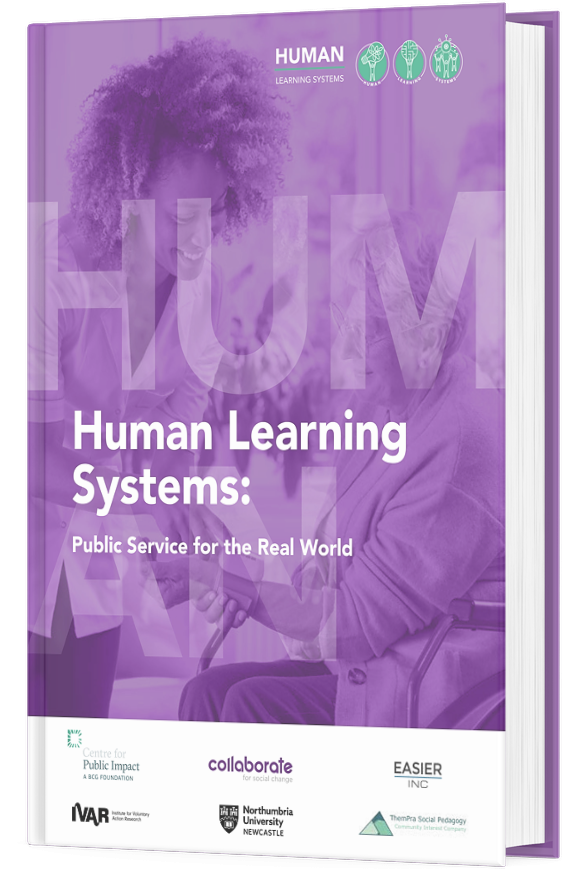Strengthening co-production and co-creating change with Human Learning Systems
‘No decision about me, without me’ Andrew Lansley

Co-Creating Change and Co-Production
There is growing recognition that children, young people, adults and their families are often not meaningfully included in making impactful decisions on the types of care and welfare services they receive or are being set up in their local communities. As Social Care Futures state, the impact of this ‘has meant that what is important to people themselves has not been directly communicated, and decisions are driven by experts other than those with lived experience’. Set against the findings of a number of recent independent care reviews of both children’s and adult social care, the importance of working in partnership to co-create and co-produce positive change has come into sharper focus. With limited resources, it is important that welfare services are delivering support that is meaningful to individuals, families, communities and wider society as a whole. As Hilary Cottam sets out in Radical Help, it’s time for a bold new approach to the welfare state which is based on a common purpose and helps people to flourish.
Working ‘With’, Not Doing ‘To’
With its strong emphasis on more equal relationships, learning cultures, well-being and ethical purpose, social pedagogy has co-production, collaboration and active participation at its heart. Its concepts and principles not only apply to working collaboratively with the people you support in practice but are equally relevant for how you develop co-production and collaboration within your team and with other professionals. For the development of active co-production and collaboration to happen within your service, it is vital that you and other colleagues (such as senior managers, team leaders and other key people) know what this means in practice, how to navigate systems, power structures, complexity and make situated judgments that allow co-production and collaboration to flourish.
Co-production and collaborative practice are receiving much attention in public service debates at the moment, but they can be challenging to implement in the current climate. Human Learning Systems offers a paradigm shift away from New Public Management with its relentless and dehumanising focus on markets, measures and managers. Instead of NPM’s imaginary world of competition, outsourcing, service fragmentation and micro-management leading to predictable outcomes and better services, HLS shows that public service happens in the real world: It requires responding to the complexities of people’s real lives to help them flourish, learning in dialogue with the people and communities we serve, and working relationally to create healthier collaborative local systems. There are increasingly more examples of this public service revolution unfolding across the UK and beyond, with transformative results. Many of these are captured in the free e-book Human Learning Systems: Public Service for the Real World’, in which we have co-authored chapters exploring the links with social pedagogy and the importance of learning in co-creating meaningful change.
Social pedagogy offers a holistic way of working with children, young people and adults in ways that support their wellbeing, learning and social inclusion. At the heart of social pedagogy lies a belief that each person deserves to be treated with dignity and possesses unique inner resources and potential, which we can help them unfold. To do so requires meaningful and authentic relationships that enable us to recognise a person’s potential, their qualities, strengths and interests, and to create learning situations in which people can experience their resourcefulness and develop new abilities. This is why social pedagogy has such relevance for co-production.
Bringing Co-Production to Life in Practice
This intensive learning programme provides an excellent opportunity for you as a practitioner at any level to explore how key principles in social pedagogy and Human Learning Systems translate into working to co-produce effective change, what this means for you, your team, the wider organisation and most importantly, how co-production can benefit the individuals, families or groups supported by your organisation. In facilitating the course, we will draw on a variety of learning methods that make co-production, collaboration and participation come to life – through a combination of experiential learning activities, group discussions, theoretical inputs, reflection and action planning on how you can develop your own practice. You’ll thus gain a first-hand insight into how you can create an inclusive setting and collaborate meaningfully.
Over the course of five 3-hr online sessions, we will build a peer learning community in which participants increasingly take on greater responsibility for supporting each other in the ongoing process of exploring co-production, collaboration and participation. The focus is on supporting you in applying your learning to your specific practice context. Why is this a powerful way to achieve practice improvement? Because converting learning experiences into meaningful behaviour change relies on three factors:
- CAPABILITY: Acquiring new skills and insights into co-production, collaboration and participation, learning and systems change theory as well as reflection methods
- MOTIVATION: Being determined to collaborate and embed active co-production in everyday practice, understanding why this is critical for improving service delivery and a purpose-driven organisational culture
- OPPORTUNITY: Finding ways to apply learning in practice, creating the space for self-reflection within the peer learning community, and identifying opportunities to support the growing network of people working to co-create change
We expect participants to commit to taking action in between sessions, so that you can practice working collaboratively in both your professional and personal life. To ensure that all course participants have a basic understanding of Social Pedagogy prior to this course, we will provide you in advance with reading materials and encourage you to register for our Massive Open Online Course in Social Pedagogy across Europe (available for free on Coursera).
Learning aims
By connecting social pedagogical concepts and principles to co-creating change and co-production, we aim to:
- provide you with an enduring understanding of:
- What co-production, collaboration and participation are, why they’re relevant for meaningful support, and how you can develop them in your practice
- Social pedagogy as an ethical orientation based on recognition and human rights, which can develop the foundations of co-production
- Human Learning Systems as a powerful alternative to New Public Management that can help you create healthier systems
- ensure you know and are able to apply:
- Relevant social pedagogical theories and principles to develop co-production and collaborative practice
- How you can initiate and sustain collaboration and co-production within a complex practice environment
- The foundations needed to be in place to help co-production take root and flourish
- make you further familiar with:
- The role of power, systems and self-reflection in developing and sustaining co-production
- Ideas and activities for developing co-production in everyday practice as well as systems and policy change
Themes
- Core concepts in social pedagogy, co-production, collaboration and participation
- Central tenets of Human Learning Systems and its potential to support co-production
- Introduction to the HLS learning cycle and how this can support co-designing experiments in co-production and change
- The Danish concept of the 3 Ps, using this reflective framework to identify and explore power, systems and positionality
- Innovate and creative methods for co-production, collaboration and participation
- How to apply learning to develop active co-production, collaboration and participation
- Supporting people with lived experience to be central in co-creating change
The course is designed to connect capability, motivation and opportunity by giving you time to explore an area of your practice that you’re determined to change, plan a micro-intervention – a small thing you’ll do to develop co-production – and commit to your peers that you’ll come back at the final session having tried this out.
Who we are
The course is facilitated by Lowis Charfe, Charlotte Firing and Gabriel Eichsteller from ThemPra. We’re all internationally experienced practitioners in social pedagogical and educational settings and have longstanding experience in facilitating collaborative practice. We’ve led on ThemPra’s pioneering projects in England and Scotland with a broad range of social care organisations and initiated several EU-funded projects exploring social pedagogy in Danish care settings and across Europe. We’ve also co-delivered the MA in Social Pedagogy Leadership in partnership with the University of Central Lancashire. As part of the HLS Collaborative, we’ve contributed to the recent e-book Human Learning Systems: Public Service for the Real World and are facilitating a peer learning community on HLS and Social Pedagogy. This learning programme draws on these collective experiences in ways that connect with your practice expertise, and we see our role as equal partners in your learning process.
Course dates
The course runs over five 3-hour session spread across two months to allow sufficient time for learning application.
Session 1: 26 Sep, 2024 – 9.30-12.30
Session 2: 3 Oct, 2024 – 9.30-12.30
Session 3: 10 Oct, 2024 – 9.30-12.30
Session 4: 17 Oct, 2024 – 9.30-12.30
Session 5: 7 Nov, 2024 – 9.30-12.30
Please note that we expect all participants to take part in every session and to commit to taking action in between each session.
Costs
The cost per participant is £265 (ex VAT). We offer a 5% discount per place to organisations purchasing 5+ places and a 10% discount per place for 10+ places. Payment can be made by bank transfer or credit card and must be received at least 14 days prior to the start date. We’re happy to add any purchase order details to the invoice.
Register your place
To book your place on this course, please complete the registration form below.
Professional standards
Upon completing the learning programme, we will provide you with a certificate over 15 hours of CPD. You can use your applied learning from this course as part of your CPD requirements, including towards the following professional standards:
Post-qualifying standards: Knowledge and Skills Statements:
Child and Family Practitioners: Relationships and effective direct work | Communication | Analysis, decision-making, planning and review | Organisational context
Child and Family Practice Supervisors: Promote and govern excellent practice | Developing excellent practitioners | Shaping and influencing the practice system | Effective use of power and authority | Purposeful and effective social work | Performance management and improvement
Child and Family Practice Leaders: Lead and govern excellent practice | Creating a context for excellent practice | Designing a system to support effective practice | Developing excellent practitioners | Support effective decision-making | Quality assurance and improvement
Social workers in adult services: Person-centred practice | Supervision, critical analysis and reflection | Organisational context | Professional ethics and leadership
Social work practice supervisors in adult social care: Values and ethics | Influencing and governing practice excellence within the organisation and community | Developing confident and capable social workers | Assuring good social work practice and development | Promoting and supporting critical analysis and decision-making | Relationship-based practice supervision | Effective use of power and authority as a practice supervisor | Performance management and improvement
Care Quality Commission – Key lines of enquiry:
Effective | Caring | Responsive | Well-led
Professional Capabilities Framework for Social Work in England:
Professionalism | Values and ethics | Diversity and equality | Rights, justice and economic wellbeing | Knowledge | Critical reflection and analysis | Intervention and skills | Context and organisations | Professional leadership
Royal College of Occupational Therapists – Professional Standards:
Understanding relationship | Service users | Develop intervention | Evaluate impact | Demonstrate quality | Collaborative | Communication | Support development
Make the case to your manager
If you’re not sure how best to argue the case for being on this course, we can help you. Here’s a template email you can adapt when contacting your manager about this course.
Further questions?
Please get in touch with us via email if you would like to know more about this course or any of our other learning activities.



